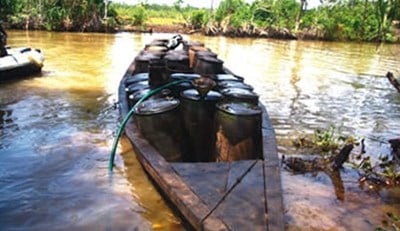There are no products in your shopping cart.
| 0 Items | £0.00 |


NIGERIA lost a total of about $30bn annually between 2005 and 2019 to revenue leakages according to a recent report by the Joint House of Representatives Committee on Finance Banking and Currency.
After a fundamental review of the nation's economy, the committee concluded that these leakages were basically from activities of agencies and companies in banking, oil exploration, engineering, procurement, construction, installation, marine transportation, manufacturing and telecommunications. According to the committee, the country has lost significant foreign exchange and revenue shortfall from the infractions.
Consequently, it grilled the management of two banks over several of the alleged infractions, accusing them of compromises. Hon James Faleke, the chairman of House Committee on Finance and co-chairman of the joint committee, said the House at its sitting on March 5, 2020, resolved to conduct an investigative hearing on revenue leakages.
Hon Faleke said: “The necessity and commencement of this investigation was as a result of growing problems in the financial management of all the God-given resources in our country, Nigeria, from our vast natural resources to the value-added by these resources in the form of foreign exchange earnings and revenue generation, etc into these investment environment and opportunities. Thus, this committee deemed it imperative to investigate revenue leakages and loopholes in the system that have contributed to a loss of over $30bn in annual federation tax revenue between 2005 and 2019.
“The investigation therefore, was premised on the documents received from target agencies and companies in banking, oil exploration, engineering, procurement, construction, installation, marine transportations, manufacturing and telecommunications upon which the committee noted significant foreign exchange and revenue shortfall infractions against the Federal Republic of Nigeria by these stakeholders. This places an imperative need to put an end to, or at best, minimise all attributable infractions that have been instruments in the hands of some stakeholders in bringing economic woes to this country and her people.
“Concealment and non-disclosure of some crude oil liftings that ought to have been subjected to Petroleum Profit Taxation at rates ranging between 50% of profit for production sharing contractors and production sharing agreement companies, and 85% of profit for joint venture companies. Inflow of foreign investments in the form of equity, foreign cash loans, equipment loans whose utilisations are majorly subject to tax, end up in transactions, foreign transfers that were at variance with the purpose of such inflows.
“Overnight and fictitious disappearance of naira proceeds of foreign inflows from the bank accounts of Nigerian beneficiaries, and subsequent allocations of foreign exchange by Central Bank of Nigeria for capital repatriations, principal loan repayments and interest payments. Multiple foreign exchange allocations to holders of foreign inflow Certificates of Capital Importation over and above the amount brought into the country, leading to capital flight of the country’s much needed and scarce foreign exchange.
“Loan backed Certificates of Capital Importations without evidence of transfer to the foreign lenders in the form of principal repayment and interest payments. Some expected imports that were funded by foreign equipment loans and other direct allocations of foreign exchange for foreign exchange valid transactions were neither translated to imports nor their import duties paid to the Nigerian Customs Service."
Nigeria has one of the lowest gross domestic product-to-tax ratios in the world at just 6%, compared with the 34% average of Organisation for Economic Co-operation and Development industrialised nations. According to the World Bank, tax revenues above 15% of a country’s gross domestic product are a key ingredient for economic growth and, ultimately, poverty reduction.